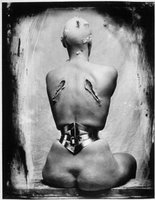 In my draft essay on fascism, I listed several important elements of fascism as I had understood them from my own experience growing up with a fascist father. One aspect of fascism that I missed in my remembrance was that of disgust--at the world, at oneself, at others. ...
In my draft essay on fascism, I listed several important elements of fascism as I had understood them from my own experience growing up with a fascist father. One aspect of fascism that I missed in my remembrance was that of disgust--at the world, at oneself, at others. ...
I recently came across a work by Martha Nussbaum, a philosopher whose work on emotions has to be the most relevant and insightful work by a thinker in America for the last half-century. The book that has piqued my interest the most is her work on disgust, as it related to women's bodies but also more generally as it plays itself out on the wider social scale, especially in the law.
In the introduction to that work, Nussbaum writes:What I am calling for, in effect, is something that I do not expect we shall ever fully achieve: a society that acknowledges its own humanity, and neither hides us from it nor it from us; a society of citizens who admit that they are needy and vulnerable, and who discard the grandiose demands for omnipotence and completeness that have been at the heart of so much human misery, both public and private. To that extent, its spirit is less Millian than Whitmanesque: it constructs a public myth of equal humanity, to substitute for other pernicious myths that have long guided us. Such a society remains elusive because incompleteness is frightening and grandiose fictions are comforting. As a patient of Donald Winnicott's said to him (in an analysis that I shall analyze in detail in chapter 4), "The alarming thing about equality is that we are then both children, and the question is, where is father? We know where we are if one of us is the father."20 It may even be that such a society is unachievable, because human beings cannot bear to live with the constant awareness of mortality and of their frail animal bodies. Some self-deception may be essential in getting us through a life in which we are soon bound for death, and in which the most essential matters are in fact beyond our control. What I am calling for is a society where such self-deceptive fictions do not rule in law and in which--at least in crafting the institutions that shape our common life together--we admit that we are all children and that in many ways we don't control the world.
I must admit that disgust has informed some of my own aesthetic works, in terms of eliciting disgust as well as its relationship to the sublime and beautiful. I've always been fascinated by the work of Joel Peter Witkin. His photographic fanstasias play on this juxtaposition of disgust and the sublime--especially in relationship to myth.
Related Links
Tuesday, May 30, 2006
Fascism, Aesthetics, Nussbaum, and Disgust
Subscribe to:
Post Comments (Atom)






1 comment:
I also have found a connection between Nussbaum and art, especially the book Postmodern Heretics by Eleanor Heartney, which covers Witkin's work. I am currently collecting broken and damaged religious art as part of my fascination with the digusting and faith (also connected to Flannery O'Connor).
Post a Comment